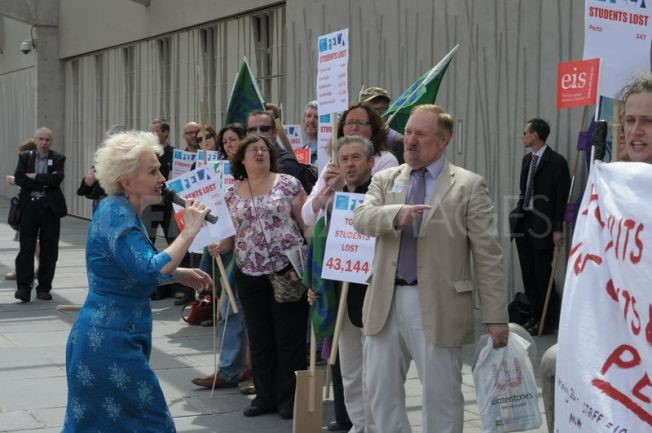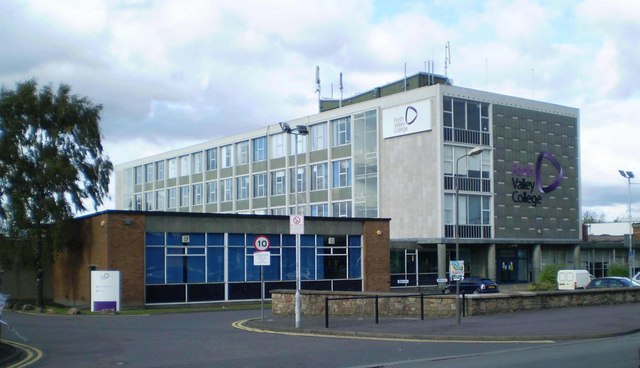Find out about The Open University's Social Sciences courses
This article belongs to the Women and Workplace Struggles: Scotland 1900-2022 collection.

Background
The rather long-winded title for our union is Educational Institute of Scotland – Further Education Lecturers’ Association (EIS-FELA). Put more simply, we are the recognised union for college lecturers in Scotland. In May 2021 we won an important victory over the proposals for the replacement of lecturers by Assessor-Instructors, which would have led to a far-reaching deterioration in terms and conditions and an undermining of the academic skills of those affected. To do the best by our students an essential part of our contract is the time we get to prepare lessons and mark assessments. Assessor-Instructors were offered none of these things which is a disservice to lecturers and most importantly to all of our students.
There are 26 colleges in Scotland with around 5,000 EIS-FELA members and the methods used to implement the process of replacement varied from one college to another. The most brutal and stark version was seen at Forth Valley College in Falkirk, which used the tactics of fire and rehire. At Forth Valley, 27 lecturers were told they were being made redundant but that they could apply for alternative Assessor-Instructor posts. By agreeing to this these lecturers discovered they were back doing their old jobs but with massively increased workloads.
Article: Scottish college lecturers call an end to strike action
Scotland’s Colleges: Workplaces of Struggle?
Before looking at the 2021 strike itself it’s worth going back a bit to see the background because this was by no means the only industrial action that college lecturers have been involved in. There is a long history of trade union members taking action in Scotland’s colleges. For the purposes of this short article, 2015 was a pivotal year in making sense of the conflicts that were to ensue in the period that followed. Since 2015, the year that the Scottish National Party-led Scottish government brought back national bargaining in place of individual plant bargaining, we have been on strike almost every single year! As in 2021, the motivation almost every time has been over the issue of equality within the sector.
In the 1990s, in the pre-devolution era, the UK Conservative government decided to put a spanner in the works of the then dominant party in Scotland, Labour, by wresting control of Further Education away from local authorities. They did this by what was called ‘incorporation’ (a form of semi-privatisation in other words) – setting up each college as an autonomous entity run by Principals as private ‘fiefdoms’ aided and abetted by tame Boards of Management.
Many of these Principals (several were women) earned more than the Scottish First Minister. To regain control, in 2015, the SNP Scottish government at Holyrood brought in a process of large-scale college mergers. The new merged ‘regional’ colleges were now answerable to the Scottish government via the Chairs of Boards it appointed. Along with this came national bargaining.
Independent Report: Review of further education governance in Scotland
By this time, after decades of what was effectively ‘plant-by-plant’ bargaining, wide disparities had opened up in terms of pay and conditions between every college. Each group of lecturers was told the following: ‘There is no money! The other colleges have accepted a deterioration in pay, terms and conditions, so you have to.’ This blackmail worked in colleges with weaker union organisation but failed in those that were strongly organised. This widened the gap between colleges even more. Ironically, what the merger process did was to combine the weaker and stronger branches which brought the militant and confident EIS-FELA ‘reps’ to elected TU leadership roles in these much larger colleges.
Striking for Equality
 Penny Gower addressing EIS-FELA lobby
Penny Gower addressing EIS-FELA lobby
As EIS-FELA branch reps, we led one of our most important strikes over ‘upward harmonisation of pay and conditions’. Pay inequality between women and men in colleges existed, in the same way that institutional sexism exists throughout society. However, with the vast majority of our members being ordinary grade lecturers, the formal and actual difference between women and men’s pay and conditions in the same college was relatively less significant than the inequality between colleges. So in other words, you could be doing exactly the same job as someone in a neighbouring college but be earning less, have more classes to teach and get fewer holidays.
When we went out on strike so that everyone would be on the same salary scale and get the same working conditions the slogan was ‘From Dumfries to Stornoway, what we want is Equal Pay!’ Trade unionists tend to see equal pay as relating only to differences between women and men, but we made it an issue of justice for all – women and men alike.
And it worked. It was in my view an honourable interpretation of what equality means. In the Edinburgh college, where I am the EIS branch secretary, we had already gone through the merger process (bringing together three colleges with very different pay and conditions). By taking all out indefinite, escalating strike action in 2014, we had already won upward harmonisation of terms and conditions. The lowest paid got a 21 per cent pay rise, while the best paid got 7 per cent. Given the high proportion of women in lecturing this did mean helping bring about gender equality.
At the EIS-FELA national executive, we learned the lessons of that local strike, and used the same tactics for all the other national campaigns and strikes successfully. We have had to conduct these against employers out to recreate their private fiefdoms by undermining national bargaining. After signing deals under pressure, they would regularly renege on them. The second running theme for EIS-FELA is #HonourTheDeal.
Defending Education, Challenging Inequalities
That is the background to the series of strikes which culminated in our victory over the shameful fire and re-hire attempts by college management. And what were the strikes basically about? Equality.
In terms of the other campaigns there is an element of gender equality in most of them. The battle against casualised work, an end to zero hours and temporary contracts, was one of our successes though managers are continually trying to find tricks to undermine it. This generally affects women more than men as they are traditionally more likely to have breaks when their children are young.
What has helped us to succeed is the knowledge that we are defending the education service we provide to our students, and the need for equal pay and conditions for our Trade Union members. They also fundamentally reflect an attitude about to how to organise, to fight and win.
We’ve always stressed the importance of the rank and file. Branch reps are in regular contact with each other across Scotland and we all hold frequent meetings with our members. In EIS jargon, it is referred to as ‘a member-led union’. And that’s how we’ve operated. If the official machine is a bit slow we tend to just do things ourselves, and EIS HQ catches up quickly enough.
We’ve always stressed the importance of politics with a small ‘p’. So, the equalities agenda does not just apply to gender but also, very importantly, to issues of anti-racism. Underlying it all is that we get to unity via equality – because everyone has their place in the union (and in society). And together this unity provides the solidarity we need.
That agenda also makes it easier when you need to use a capital ‘P’. Because the employers have always been out to sabotage national bargaining and regain their control of each college. To do that, they have shown repeatedly how little they care for the students, willing to see strikes run until our members are broken financially. However, despite there being no strike pay, members again stood firm, knowing that the conditions we teach in are the conditions our students learn in. The NUS was clear on that too, and supported us. So with intensive lobbying, our strikes have prompted government intervention (against its will) for us to reach settlements on almost every occasion.
Article: Scotland's colleges facing 'indefinite three-day strikes'
That is why, in our strike in 2021 against fire and re-hire, we began planning the previous December for action, we focused on the date of the Scottish Parliament elections (6 May 2021) and worked backwards from there to judge when to declare the dispute, when to have the ballot, and at what pace to escalate the strikes. We were therefore set to be hitting peak strike action on 6 May, but the employers caved in, no doubt secretly urged on by politicians, on 4 May 2021!
Article: Scottish colleges in chaos as lecturers go on strike

Rate and Review
Rate this article
Review this article
Log into OpenLearn to leave reviews and join in the conversation.
Article reviews